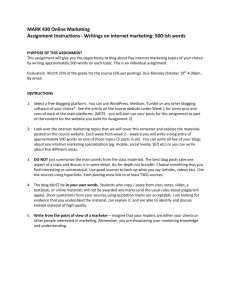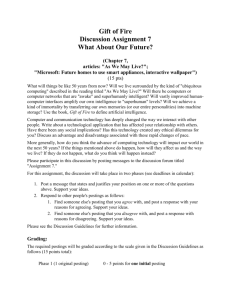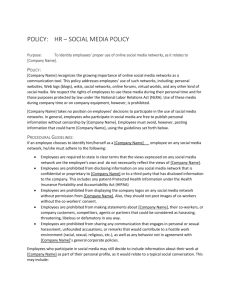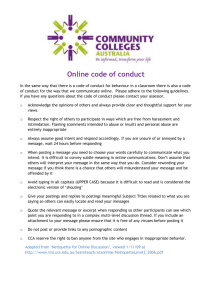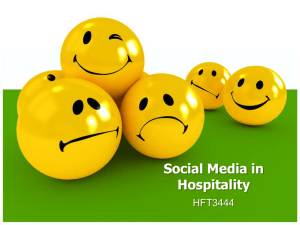Policy We recognize that the vast majority of our employees are
advertisement
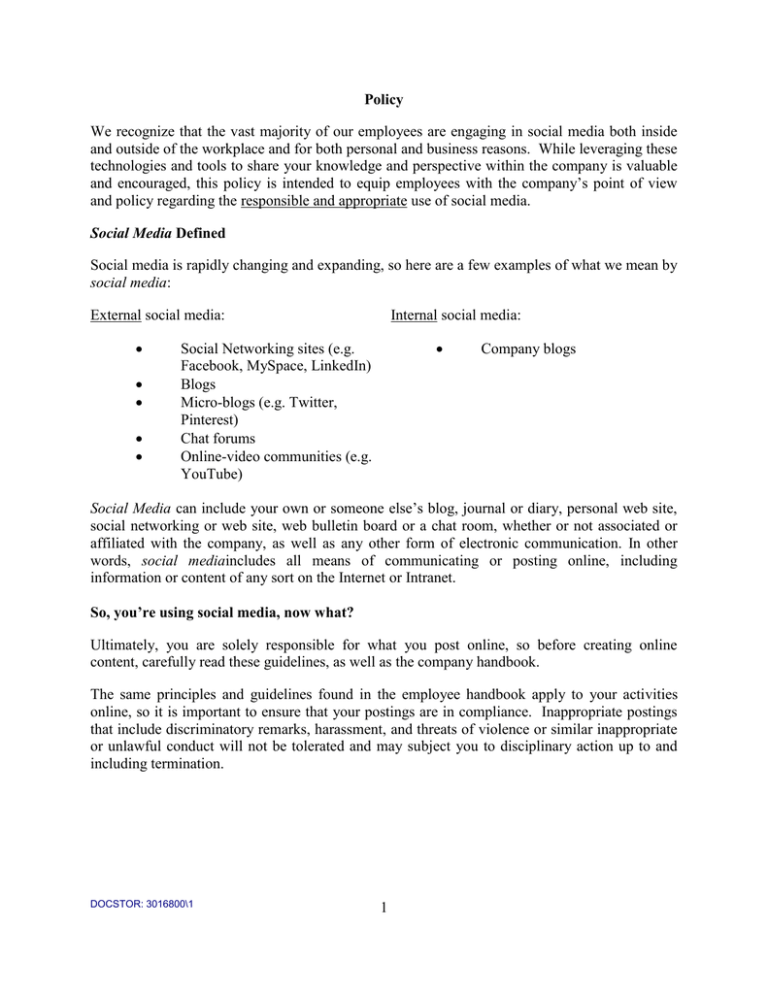
Policy We recognize that the vast majority of our employees are engaging in social media both inside and outside of the workplace and for both personal and business reasons. While leveraging these technologies and tools to share your knowledge and perspective within the company is valuable and encouraged, this policy is intended to equip employees with the company’s point of view and policy regarding the responsible and appropriate use of social media. Social Media Defined Social media is rapidly changing and expanding, so here are a few examples of what we mean by social media: External social media: Internal social media: Social Networking sites (e.g. Facebook, MySpace, LinkedIn) Blogs Micro-blogs (e.g. Twitter, Pinterest) Chat forums Online-video communities (e.g. YouTube) Company blogs Social Media can include your own or someone else’s blog, journal or diary, personal web site, social networking or web site, web bulletin board or a chat room, whether or not associated or affiliated with the company, as well as any other form of electronic communication. In other words, social mediaincludes all means of communicating or posting online, including information or content of any sort on the Internet or Intranet. So, you’re using social media, now what? Ultimately, you are solely responsible for what you post online, so before creating online content, carefully read these guidelines, as well as the company handbook. The same principles and guidelines found in the employee handbook apply to your activities online, so it is important to ensure that your postings are in compliance. Inappropriate postings that include discriminatory remarks, harassment, and threats of violence or similar inappropriate or unlawful conduct will not be tolerated and may subject you to disciplinary action up to and including termination. DOCSTOR: 3016800\1 1 Protecting Our Information When it comes to sharing company information via social media, make sure you know what is appropriate to share. When it comes to sharing information – whether in print, verbally or in a blog or social networking site – it boils down to this: Pause - consider the sensitivity of the information you’re about to share and where it falls under our company’s policy and whether its publication in social media is prohibited by that policy; Protect - assess whether it is appropriate to share this information with others and whether the use of social media is the appropriate and best means to reach your intended audience; Proceed accordingly. In adhering to these guidelines – within social media – as elsewhere, the following considerations are important: Maintain the confidentiality of company trade secrets such as information regarding the development of systems, processes, products, know-how and technology. Do not share private or confidential business information such as strategies, new partnerships or customer information. Do not post internal reports (e.g., financial reports) or policies, procedures or other internal business-related confidential communications unrelated to your terms or conditions of employment. Respect financial disclosure laws. It is illegal to share confidential financial forecasts or results, or give a “tip” on material inside information to others so that they may buy or sell stocks or securities. Such online conduct may also violate the company’s insider trading policies. Be Responsible and Respectful; Be Honest, Accurate and Transparent Keep in mind that you are more likely to resolve work-related complaints by speaking directly with your co-workers or human resources than you are by posting complaints to a social media outlet and that it is not appropriate to air workplace grievances online. Do not create a link from your blog, website or other social networking site to a company website without identifying yourself as a company employee. Express only your personal opinions. Never represent yourself as a spokesperson for the company. If the company is a subject of the content you are creating, be clear and open about the DOCSTOR: 3016800\1 2 fact that you are an employee and make it clear that your views do not represent those of the company, its customers, its vendors or others working on behalf of the company. If you are endorsing, rating, or reviewing company products or services, always disclose that you are an employee. It is best to include a disclaimer such as “Although I work for the company, the postings on this site are my own and do not necessarily reflect the views of the company.” With the exception of approved spokespersons, employees are not authorized to comment as official spokespersons on business-related matters, including acting on behalf of the company. For example, as an individual employee you may not offer to answer questions on behalf of the company from the general public about the company, product promotions, special events or issues. You can participate in external online conversations relating to the company, but you must identify the company as your employer and be clear that the views you’re expressing are separate from your affiliation with the company. Use a disclaimer such as: "This is a personal blog (vlog, podcast, etc.). The views and opinions expressed on this site are my own and are not made on behalf of my employer." Remember that the company’s policy on reference requests, which is outlined in the Employee Handbook, also applies to social media. Use Company Equipment Wisely As explained in the Employee Handbook, communication technology, like computers, should be used primarily for business purposes. Incidental and occasional personal use is permitted, including engaging in reasonable and appropriate external online social media as long as it does not interfere with performing your job responsibilities and is not prohibited by our policies. For example, using, maintaining or accessing sexually explicit, lewd or obscene messages, graphics, video, data or other information on company systems or equipment is strictly prohibited. Just like with e-mail, whenever you’re using the company’s systems or equipment, don’t expect privacy - they’re owned by the company and intended primarily for business use, so the company reserves the right to monitor, review and retain communication and information that you access, transmit or create on them. It is permitted to use internal social media tools to post links to your external social media sites (e.g., adding a link to your Flickr site from your My Site); however, use your best judgment. Protect the Company’s Brand Respect the laws regarding copyrights, trademarks, and rights of publicity. Do not use the company’s trademarks, logos, or copyrighted images on or through any form of external social media in a way that infringes the company’s trademarks or copyrights, or is otherwise likely to confuse others that the company originated, authorized, sponsored, or is affiliated with your use. What you can do is refer to or describe company services or products or our specific brand names in plain text. The same rule applies for posting other companies’ intellectual property. DOCSTOR: 3016800\1 3 Do not publish any third party trademarks, logos or copyrighted images, except when it is absolutely necessary to accurately identify another’s goods or services, and then only in plain text. Monitoring Employees should be aware that the company routinely monitors public blogs, public media and social media sites for reference to the company name and other key words relating to the company and its business. Third Parties Employees are not permitted to reference in their social media activities any partners or suppliers without their approval and the approval of the company. Employees are not to engage in debate with customers online. Instead, if you see that someone has posted something inappropriate or inaccurate about the company on social media please send an email to [insert title] and the company will determine whether or not follow up will take place. Keep Current The social media environment is constantly changing. These guidelines will be updated as necessary, so review them periodically to ensure you have the most up-to-date information. Retaliation is prohibited The company prohibits taking negative action against any employee for reporting a possible violation of this policy or for cooperating in an investigation. Any employee who retaliates against another employee for reporting a possible violation of this policy or for cooperating in an investigation will be subject to disciplinary action, up to and including termination. DOCSTOR: 3016800\1 4

